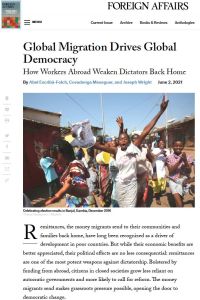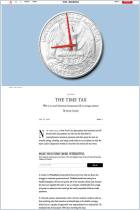
Global Migration Drives Global Democracy
How Workers Abroad Weaken Dictators Back Home
Recommendation
Transnational remittances from émigrés in wealthier nations to less well-off communities back home benefit those groups not only economically but also politically, say professors Abel Escribà-Folch, Covadonga Meseguer and Joseph Wright. In this intriguing article, the authors note that remittances make well-funded dissent possible, which in turn can result in peaceful transitions to democratic governance. Foreign aid and philanthropy rarely contribute to such transformations. Students of both economics and political science will find this an important addition to the literature on migration and cross-border payments.
Summary
About the Authors
Abel Escribà-Folch is an associate professor of political science at Universitat Pompeu Fabra, Barcelona. Covadonga Meseguer is an associate professor of economics at ICADE, Comillas Pontifical University, Madrid. Joseph Wright is a professor of political science at Pennsylvania State University.

















Comment on this summary